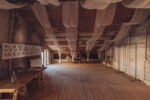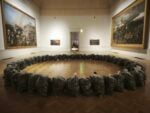Agrigentérotique
 (1200x584).jpg)
A mezzo secolo dalla frana che colpì Agrigento, una mostra a cura di Dario Orphée La Mendola ricorda la tragedia.
Comunicato stampa
A mezzo secolo dalla frana che colpì Agrigento, una mostra a cura di Dario Orphée La Mendola ricorda la tragedia. Tre opere site-specific, dai titoli in latino, che possono essere “lette” singolarmente o come scene di un’unica opera, offrono un’indagine estetica su quanto accaduto nella città dei Templi nel corso del Novecento, dalla devastazione urbana all’eredità contemporanea.
Esse, similmente a persone cui è stata violata la serenità domestica, sono state “accolte”, cioè esposte, presso la Farm Cultural Park di Favara, dimostratasi favorevole al progetto, con un mese di anticipo rispetto alla data dell’anniversario, e inaugurate il 19 Luglio, giorno in cui si svolgerà la conferenza omonima.
La mostra, fondamentalmente sperimentale, e che s’ispira ai principi della permacultura, è stata intramezzata da differenti iniziative: da esposizioni private a improvvise installazioni urbane temporanee, senza un termine preciso e con una programmazione in costante aggiornamento. Ciò è accaduto soprattutto per avviare un processo di allontanamento dalle regole imposte dal sistema dell’arte contemporanea, oggi purtroppo non in grado di ironizzare su stessa, avendo smarrito il suo sguardo infantile.
Le opere presenti alla Farm sono state esposte in appositi allestimenti installativi, all'aperto, rendendo il fruitore parte integrante dell’opera, mettendolo in relazione con l’atmosfera circostante, accompagnate da una prosa di Dario Orphée La Mendola.
Salvo Barone, con Obstupesco (2017), ha illustrato due donne e un uomo in atteggiamento smarrito, le cui posizioni anatomiche, che sembrano tratte da fotografie storiche, sono prive di qualsiasi riferimento preciso, perché indefinibile è l'atmosfera che li avvolge. Essi, come se fossero stati appena sfollati e desiderassero comprendere il loro destino, immobilizzati in un costante presente, appaiono in cerca di conforto, osservando inermi la tragica frantumazione della propria abitazione, ma divengono involontariamente parte di un ipotetico appartamento franato, il quale potrebbe essere il loro, abbandonato in fretta per mettersi in sicurezza, congelato dal tempo.
Momò Calascibetta, con Cui prodest? (2017), ha analizzato ironicamente l’inettitudine dell’artista contemporaneo al tempo della speculazione edilizia in Italia, il cui sforzo non è mai stato all’altezza di produrre opere che potessero fronteggiare il potere, favorendolo invece egoisticamente. La fronte corrugata del protagonista solitario suggerisce il senso di sofferenza durante l’atto poietico, il cui mancato prodotto, sottolineato dalla carta igienica intonsa intorno, dimostra che ancora tanto deve essere fatto. La percezione della realtà interna è influenzata dalla scelta prospettica, giocando meravigliosamente con i chiaroscuri dei panneggi, inscrivendo la scena in una dinamicità espressivamente forte.
Alfonso Siracusa, con Error communis (2017), ha recuperato oggetti collegati storicamente alla frana, inserendoli in un ambiente caratterizzato dalla duplicità, rendendo evidente una frase della celebre inchiesta Martuscelli. Le reti metalliche, divise in basso dal coltello che effettua un taglio con il passato, riportano le stelle della Marina militare raffiguranti la costellazione del cancro. Più avanti una finestra, che incornicia un pilastro del viadotto posto dirimpetto alla città, se aperta svela, sotto l’influsso di simbologie alchemiche riattualizzate, la vittima della frana posta su una mappa della città recante punti di interesse franoso, il cui mancato intervento allarma l’osservatore allo specchio.
Dario Orphée La Mendola
-----------------------------------------------------------------------------------------------------------------------------------
Text Engl.
Farm Cultural Park | Agrigentérotique a cura di Dario Orphée La Mendola Salvo Barone Momò Calascibetta Alfonso Siracusa
Half a century after the landslide that hit Agrigento, an exhibition by Dario Orphée La Mendola recalls the tragedy. Three site-specific works, from Latin titles, which can be “read” individually or as scenes of a single theatrical work, offer an aesthetic investigation of what happened in the city of the Temples during the twentieth century, from urban devastation to Contemporary heritage. Similarly to people who have been violated the domestic serenity, they were “welcomed”, that is exhibited at the Farm of Favara, which proved to be favorable to the project, one month in advance of the anniversary date, and symbolically inaugurated on 19 July. The exhibition, fundamentally experimental and inspired by the principles of permaculture, has been interspersed with various initiatives: from private exhibitions to temporary temporary urban installations, without a precise term and with a constantly updated schedule. This has happened especially to start a process of getting away from the rules imposed by the contemporary art system, today unfortunately not being able to ironize on itself, having lost its childish look. The works at the Farm, reproductions of the original, have been exhibited in special outdoor installations, making the guest an integral part of the work, putting it in relation to the surrounding atmosphere, accompanied by a prose by Dario Orphée La Mendola. Salvo Barone in “Obstupesco”, depicted three lost-minded persons: two women and a man, whose anatomical positions, which appear to have been taken from historical photographs, are devoid of any precise reference, because the ambience that envelops them is indefinable. They, as if they had just been displaced and wanted to understand their fate, immobilized in a constant present, appear to be looking for comfort, observing the tragic crushing of their dwelling unintentionally, but becoming involuntarily part of a hypothetical sloping apartment, which could be theirs, abandoned in a hurry to secure themselves, frozen by time. Momò Calascibetta in “Cui prodest?”, ironically analyzed the ineptness of the contemporary rtista t the time of construction speculation in Italy, whose effort has never been able to produce works that could face power, but on the contrary favoring it egoistically. The corrugated face of the lonely protagonist suggests the sense of suffering during the act of initiation, whose lack of product, underlined by the toilet paper intoned around, shows that much remains to be done. The perception of the inner reality is influenced by the prospective choice, playing wonderfully with the chiaroscuro of the drama, inscribing the scene in an expressively strong dynamism.
Alfonso Siracusa in “Error communis”, retrieved historically linked objects to the landslide, inserting them in a context characterized by duplicity, making a statement of the famous Martuscelli investigation apparent. The metal nets, divided by the knife that makes a cut with the past, portray the stars of the Navy depicting the constellation of cancer. Further on, a window framing a pillar of the viaduct facing the city, if opened reveals, under the influence of alchemically re-altered symbologies, the victim of the landslide placed on a map of the city with landmark points of landslide interest, whose failure to intervene alarms the observer in the mirror.
Traslation by Annareta Sciacca
Titolo: Agrigentérotique
a cura di: Dario Orphée La Mendola
artisti: Salvo Barone, MoMò Calascibetta, Alfonso Siracusa
spazio: Farm Cultural Park – Favara
inaugurazione: Mercoledì 19 Luglio 2017 ore 18,30
organizzazione generale: Andrea Bartoli e Florinda Saieva
public relation: Salvo Sciortino e Giovanna Arnone
fotografie: Gerlando Sciortino
digital animation | visual design: Elia Zaffuto e Giuseppe Miccichè
webmaster Farm: Rosario Castellana
durata: 19 Luglio | 20 Settembre 2017
orario: tutti i giorni 10-24 _ ingresso libero



